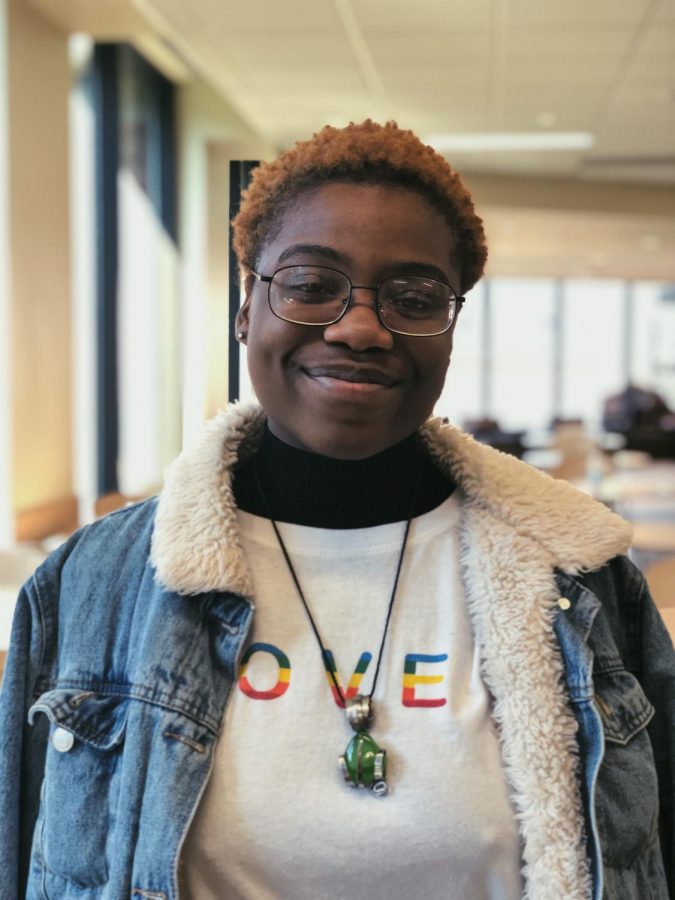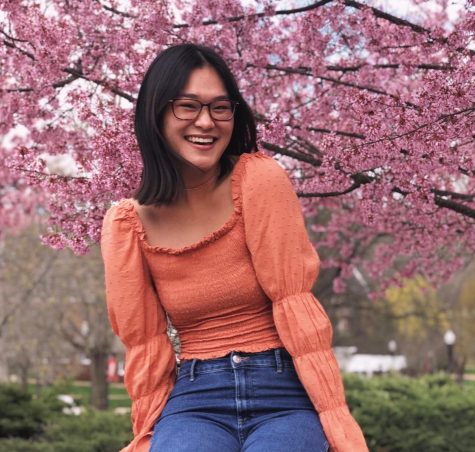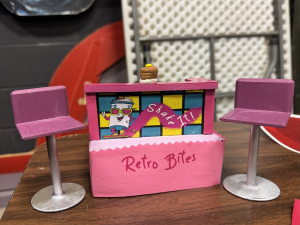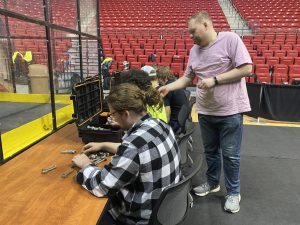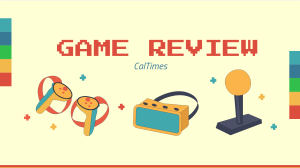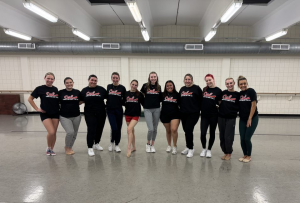Their Story
Navigating Cal U college life as a nonbinary student
Blaine Hill-Banks, a student at Cal U, identifies as nonbinary, a term used to describe someone whose gender identity isn’t exclusively male or female.
February 3, 2020
Sitting in a neon orange hoodie with their small, dark hands folded on top of the synthetic wood tabletop, Blaine Hill-Banks looked like someone who was sure of themselves. Hair cut within an inch of itself and loose, baggy clothes shaping their small frame, Hill-Banks is definitely an androgynous character, something that used to be a rarity but is now seen more commonly across college campuses.
The notion that Hill-Banks is secure in themselves is only reinforced when they opened their mouth to speak in soft yet confident statements. One would never guess that there was a time when Hill-Banks was not as comfortable in their own skin as they appeared in that moment.
Born Milane Hill-Banks, Blaine takes on many different identities depending on who they are around. At home, they are out about being pansexual but not about their gender.
“Everyone back in Philly still calls me Mimi,” Hill-Banks said. At college, however, Blaine is open about how they identify. “I prefer them/their pronouns. I don’t mind he or she at all.”
Though identifying as gender fluid is not a new concept, Hill-Banks can remember many different occasions where people they meet are just not entirely sure what it means. Hill-Banks described their gender identity as being on the spectrum of male to female most days, while some days they’re not on this spectrum at all.
“Some days I just wake up and I’m like, ‘I don’t know.’ It’s definitely not a set thing for me all day,” said Hill-Banks.
Hill-Banks related this feeling in terms of clothes to further illustrate their point. There have been days when Hill-Banks wakes up and felt like a girl. They would throw on a bunch of girly clothes in the morning but would completely change to feeling masculine by the afternoon. “I’m just like, well, I’m stuck in a miniskirt and some heels. I don’t know what to do now. So, definitely spectrum at all times. There’s never just one set thing all day,” they said.
Entering college is a daunting task for anyone. Many will talk of their worries in regard to schoolwork, making friends, and making a name for themselves. Hill-Banks recalled their first few days at California University of Pennsylvania. While participating in an activity outside during Welcome Weekend, Hill-Banks introduced themselves as gender fluid. “The teacher was like ‘yes! yes!’ And the entire group just went silent. Other people were just like ‘okay, whatever’ and continued to the next,” recalled Hill-Banks. Following the activity, a girl came up to Hill-Banks and asked for them to explain more about being gender fluid.
“I explained it and she was just like ‘you can’t change what God gave you’ and walked away.” As the girl left, Hill-Banks was left standing alone and confused. “I didn’t know how to feel about that. Obviously, half the kids here are super cool. Of course, there are gonna be some bad apples now and again,” Hill-Banks said. While this wasn’t the warm welcome many other students experience coming to school, Hill-Banks hasn’t interacted with others as blunt since.
Despite what many think, one doesn’t necessarily have to be a full-grown adult to recognize their gender identity. This revelation can be apparent at a young age. Hill-Banks had known about their gender identity since middle school.
“In middle school, I was kinda just like ‘mmmm. Not really pretty sure about this whole girl thing.’ And then for the longest time, I thought I was trans. And then I was like ‘oh my god, I’m a boy. I don’t know what to do.’” Eventually, they learned what being non-binary meant and how it acted as an umbrella term for many other identities that come underneath it. After they decided to go by non-binary pronouns, Hill-Banks explained how even they began to misgender themselves.
They chose to continue using “she” until going to new places, like college. Then, Hill-Banks said, they would start to inscribe they/them pronouns when being introduced to new people. For the most part, Hill-Banks said they usually received a mix of two different responses when a new person at Cal U learns of their gender identity. For some, it took a second glance and a shrug as if to say, “Sure, whatever.” For others, Hill-Banks’s gender fluidity was the deciding factor in cutting them off entirely and feeling as if they cannot talk anymore.
While going to college as a non-binary student was an obstacle to overcome, it also affected their outlook on life. To Hill-Banks, college and the way it functions is inherently structured. Everyone needs to choose a major, there are certain clubs you need to join, small communities exist and function separately within the dorms. This parallels societal views on people as well. Students are nerds, jocks, hippies, mean girls, straight, gay, or lesbian. However, in life, people don’t fit inside these boxes and things can’t be categorized so easily in Hill-Banks’s eyes. Being gender fluid worked against such structure.
“It doesn’t fit like that… at all… When you open up to the fact that everything is such a wide range, [you start realizing] why is everyone just putting themselves in these categories when you really don’t need to? And because of that, it’s kinda changed my approach to life,” they said.
This laid-back way of living was apparent to even Hill-Banks’s professors. Craig Fox remembered Hill-Banks accidentally going to the wrong section of Honors and University Orientation on the first day of class. Rather than be embarrassed or upset, Hill-Banks took their mistake in stride and made fun of themselves. “They were very self-deprecating about it… Some students wouldn’t have had that attitude,” Fox said. “From that experience, I thought that they have a healthy sense of self.”
Traditionally, Cal U, due to its location, has the reputation of being one of the more culturally conservative of the state system schools. However, there has been a steady change in the campus in becoming more inclusive to non-binary and LGBTQ students. In fact, Hill-Banks is one of the first to live in the Diversity, Equality, & Inclusion community, a wing located on the second floor of Smith Hall dedicated to giving students of color, different background, religion, gender identity, political affiliation, ability, etc., a safe space to be themselves.
Forward steps, such as this one, are encouraging to those who seek a world where things like gender or sexual orientation don’t matter. Hill-Banks hopes that being gender fluid and non-binary becomes more normalized in the future because as of right now, “People see the norm as straight, white, cis-guys.”
For someone who certainly has not had it easy growing up, Blaine Hill-Banks is proud of where they are now. Starting college, meeting new people, being accepted are all things that they couldn’t have imagined as a confused and struggling 12-year-old middle schooler. Life gets better. The world is different now, and so is Blaine. “It’s such a change from when I was 12. It’s wonderful.”


